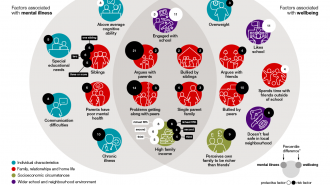
- Our studies
- Our research
- Publications and resources
- Data access and training
- About
- News
- Events
- Get in touch
- Join our mailing list

Welcome to our news and blogs section. Here you’ll find the latest developments and insights from across our longitudinal studies.

In this blog for World Mental Health Day, Dr Praveetha Patalay examines the factors that influence children’s mental illness and wellbeing using the Millennium Cohort Study.
Parents, the family home, and children’s own attitudes and behaviours could all contribute towards reducing educational inequalities, a recent study shows.

Eleven-year-olds who have someone at home making sure they finish their homework before taking part in other activities, such as watching TV, score higher on cognitive assessments than those who do not.
Children’s literacy, maths ability and behaviour are not on average harmed if their mothers go out to work during the first years of their lives, a leading researcher said today. Data from earlier UK studies had indicated a small disadvantage in literacy among children born before the mid-1990s whose mothers had worked in their early […]

Children in homes where both parents are employed are more likely to be overweight compared to those from families where mothers stay at home.
Children born to younger mothers may need additional government support if they are to fulfil their potential, a new report suggests.
People who lose their jobs are less willing to trust others for up to a decade after being laid-off, according to new research from the University of Manchester.
People with good motor coordination at 10 years old tend to spend less time in front of screens – either computer or TV – in adolescence and middle-age. They are also more likely to be physically active in their early 40s.
Primary school pupils with special educational needs are twice as likely as other children to suffer from persistent bullying, according to new research published by the Institute of Education (IOE), University of London.
Obesity rates among children with learning difficulties are higher and rise faster than children without these disabilities, according to findings from the Millennium Cohort Study (MCS).

Children with severe conduct and hyperactivity problems at school entrance tend to gain lower scores in vocabulary tests during adolescence, according to a new study.

Children with autism are at greater risk of being bullied by both their siblings and their peers, compared to those without autism.
Ryan Bradshaw
Senior Communications Officer
Phone: 020 7612 6516
Email: r.bradshaw@ucl.ac.uk